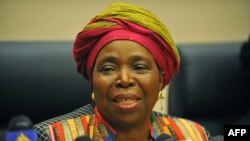WASHINGTON, DC —
Nkosazana Dlamini-Zuma, the Chairperson of the African Union Commission, recently spoke before audiences in Washington and New York on the future of the AU and on Africa’s opportunities and challenges. During her visit, she was recognized as a visionary and legend of Africa's economic and political "renaissance" by the GB Group Global – an organization that focuses on innovative and sustainable solutions in the energy, environment and health sectors.
Mrs. Zuma says with the African Union celebrating its fiftieth anniversary, she’s been able to step back and reflect on what the organization has achieved. She's also been thinking about the AU's agenda for the next 50 years.
“Amongst the most important priorities I discussed was the need to invest in our people. We are a very young, energetic, creative population, which is growing and it’s going to double by 2050 and triple by the turn of the century,” she noted.
Young people, she said, are one of Africa's most precious possessions but also a big liability.
“We want to call a skills revolution - [so] most African boys and girls…can go into research, science and technology, innovation [but also] be able to say 'no' when people want to recruit them to become rebels,” said the AU chairwoman.
In fact, conflict resolution is a top issue for the AU. The ongoing crisis in the eastern part of the Democratic Republic of Congo is presenting great challenges for it and the international community. Mrs Dlamini-Zuma says if anything goes wrong in the DRC, it is felt across the rest of the continent. Therefore, one of the ways of ending the conflict is by strengthening security forces – and allowing the government to exercise authority across the country.
In another case of unrest – in the Central African Republic - she said more effort should be made to include the public in day-to-day operations because “when people feel marginalized, when they do not feel included in the political and economic life of the country – then they are likely to rebel.”
Mrs. Dlamini-Zuma spoke on other pressing issues, including agriculture.
She said there's a need to reverse the trend of importing food to exporting food, “we’ve got huge tracks of arable land that can still we use. And we also want to process the foods that we produce, so when we send exports, it’s not just raw [and unprocessed materials]." She insisted in managing Africa's abundant natural resources to create wealth.
On Kenya and the International Criminal Court, she said “we cannot say one size fits all in terms of Africa’s courts. If you look at Kenya, back in 2007, when this matter arose, the Kenyans didn’t feel their courts could deal with this matter because they were not reformed. So, they sent the matter to the ICC. But over the last five years, they have a new constitution and have reformed their judiciary, and they feel confident now that their judiciary can manage.”
On Egypt she said the AU position is that “it was an unconstitutional change of government, that is why Egypt is not participating in activities of the AU, but we are keen that Egypt comes back. We have set up a high level team led by the former president of Mali, President Konare, and former chair of the AU and by the former president of Botswana and current prime minister of Djibouti. When we take that stand, it’s not punitive. It’s to engage the country and work with them so they can go back to constitutionality.”
On her outlook for democratic rule in Mali, she first congratulated the new president, Ibrahim Boubacar Keita and later said “it’s important for the Malians together to find a lasting solution for the problems they have been facing in the north and south and find a way both northerners and southerners feel equally Malian in whatever is going on. Mali also needs to be assisted in terms of development and infrastructure.”
She also commented on the upcoming vote to determine whether citizens of the enclave of Abyei remain a part of Sudan or join South Sudan. “It’s important as we go toward the referendum for both sides to be assured that whatever its outcome, it will not disadvantage the people who have been living in Abyei from the north or south,” she said.
She said that in addition to the governments, Africa’s people should drive the AU so-called 2063 agenda adding “we have been interacting with all Africans, trade unions, business, youth, and we’ve launched a website where organizations and individuals can send their ideas – what Africa should like in 2063 and what steps we should take.”
On the question of a future candidacy for president of South Africa, she said she's been too busy in her current position to give it much thought.
Mrs. Dlamini-Zuma said the African Union is doing its best in spite of criticisms that it’s not doing enough, and she believes an all-inclusive vision is indeed the best way to galvanize the continent.
Mrs. Zuma says with the African Union celebrating its fiftieth anniversary, she’s been able to step back and reflect on what the organization has achieved. She's also been thinking about the AU's agenda for the next 50 years.
“Amongst the most important priorities I discussed was the need to invest in our people. We are a very young, energetic, creative population, which is growing and it’s going to double by 2050 and triple by the turn of the century,” she noted.
Young people, she said, are one of Africa's most precious possessions but also a big liability.
“We want to call a skills revolution - [so] most African boys and girls…can go into research, science and technology, innovation [but also] be able to say 'no' when people want to recruit them to become rebels,” said the AU chairwoman.
In fact, conflict resolution is a top issue for the AU. The ongoing crisis in the eastern part of the Democratic Republic of Congo is presenting great challenges for it and the international community. Mrs Dlamini-Zuma says if anything goes wrong in the DRC, it is felt across the rest of the continent. Therefore, one of the ways of ending the conflict is by strengthening security forces – and allowing the government to exercise authority across the country.
In another case of unrest – in the Central African Republic - she said more effort should be made to include the public in day-to-day operations because “when people feel marginalized, when they do not feel included in the political and economic life of the country – then they are likely to rebel.”
Mrs. Dlamini-Zuma spoke on other pressing issues, including agriculture.
She said there's a need to reverse the trend of importing food to exporting food, “we’ve got huge tracks of arable land that can still we use. And we also want to process the foods that we produce, so when we send exports, it’s not just raw [and unprocessed materials]." She insisted in managing Africa's abundant natural resources to create wealth.
On Kenya and the International Criminal Court, she said “we cannot say one size fits all in terms of Africa’s courts. If you look at Kenya, back in 2007, when this matter arose, the Kenyans didn’t feel their courts could deal with this matter because they were not reformed. So, they sent the matter to the ICC. But over the last five years, they have a new constitution and have reformed their judiciary, and they feel confident now that their judiciary can manage.”
On Egypt she said the AU position is that “it was an unconstitutional change of government, that is why Egypt is not participating in activities of the AU, but we are keen that Egypt comes back. We have set up a high level team led by the former president of Mali, President Konare, and former chair of the AU and by the former president of Botswana and current prime minister of Djibouti. When we take that stand, it’s not punitive. It’s to engage the country and work with them so they can go back to constitutionality.”
On her outlook for democratic rule in Mali, she first congratulated the new president, Ibrahim Boubacar Keita and later said “it’s important for the Malians together to find a lasting solution for the problems they have been facing in the north and south and find a way both northerners and southerners feel equally Malian in whatever is going on. Mali also needs to be assisted in terms of development and infrastructure.”
She also commented on the upcoming vote to determine whether citizens of the enclave of Abyei remain a part of Sudan or join South Sudan. “It’s important as we go toward the referendum for both sides to be assured that whatever its outcome, it will not disadvantage the people who have been living in Abyei from the north or south,” she said.
She said that in addition to the governments, Africa’s people should drive the AU so-called 2063 agenda adding “we have been interacting with all Africans, trade unions, business, youth, and we’ve launched a website where organizations and individuals can send their ideas – what Africa should like in 2063 and what steps we should take.”
On the question of a future candidacy for president of South Africa, she said she's been too busy in her current position to give it much thought.
Mrs. Dlamini-Zuma said the African Union is doing its best in spite of criticisms that it’s not doing enough, and she believes an all-inclusive vision is indeed the best way to galvanize the continent.












